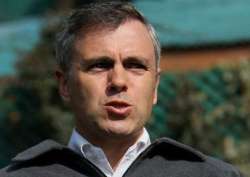J&K floods: People's anger justified, says CM Omar Abdullah
Srinagar: Terming the flood situation in the flood-ravaged Kashmir Valley as ‘very serious', Jammu and Kashmir Chief Minister Omar Abdullah on Wednesday said he understood the anger of the people affected by the ‘unprecedented' catastrophe.Omar

Srinagar: Terming the flood situation in the flood-ravaged Kashmir Valley as ‘very serious', Jammu and Kashmir Chief Minister Omar Abdullah on Wednesday said he understood the anger of the people affected by the ‘unprecedented' catastrophe.
Omar also dismissed criticism of his government in the handling of the flood crisis, saying joint efforts involving various agencies including his administration are being made to help people tide over the crisis.
Over 200 people have been killed in floods, landslides and house collapses triggered by torrential rains. Four lakh people still remain stranded.
Omar had on Tuesday described the floods that has devastated the state as the worst in 109 years.
Asked about the criticism of the state government over the handling of the situation, Omar said if there was heckling,
"People are alive to shout slogans, I have no problems. It means that these people have been rescued, they have been accommodated somewhere. Where they have been accommodated is not my concern," he said.
"I understand the anger of people. I don't grudge them. They have gone through difficult times,” he added.
Congress leader Saifuddin Soz was heckled in one of the relief camps.
Omar said the situation was unprecedented.
"The focus is entirely on making available all assets. such situations are handled through joint efforts... It is a very serious humanitarian situation in terms of rescue and relief of the people. ... It is an unprecedented situation. In nobody's life time, we remember water to be at this level. It is something nobody could have prepared for. The efforts of the central government, army, air force and state government and operations have been ramped up. Supplies are arriving and we are doing our best to rescue people," he said.
The Chief Minister said there was no ‘weakness' in coordination between the forces on ground and the state government is working together with the armed forces.
"I am in touch with the Army, the Navy and trying to make sure that the right stuff reaches the right place and we are able to achieve the stuff properly. We are not able to communicate with the people," he said.
He said the main source of worry for him was the likely spread of diseases after the water level in flood-hit areas recedes.
On the situation on the ground, Omar said there has been a complete breakdown of communication in the state after the floods.
"Any communication with the outside world has been through the handful of satellite phones that we have. The backbone of the communication has been what the Army and IAF have set up. Cell phones, landlines and Internet services are completely down," he said.
The Chief Minister said BSNL has flown in equipment and engineers to establish a temporary telephone exchange to enable communication with the rest of the world.
"At this point in time, we have multiple focus areas, in those areas where people are marooned, our effort is to try and rescue them using helicopters and boats. Where rescue is not possible due to various reasons, we are trying to drop supplies. At the same time, work on restoring communication is on," he said.
Omar said he has not been able to communicate with people and, "I have not been able to speak to 90 per cent of my Cabinet colleagues."
On allegations that the state government came into action only after Prime Minister Narendra Modi visited the state, he said, "Actually we woke up long before he arrived. The Prime Minister didn't assume that such a situation would arise.”
He said when the Prime Minister had arrived, the situation, though difficult, was under control and the present ‘unprecedented situation' developed only after the Jhelum river breached its bank and a large party of Srinagar city was under water.